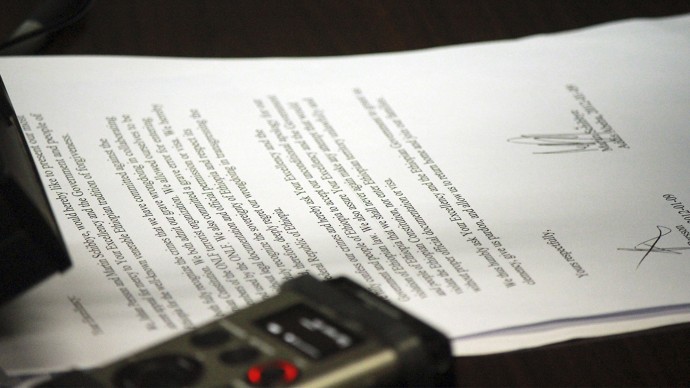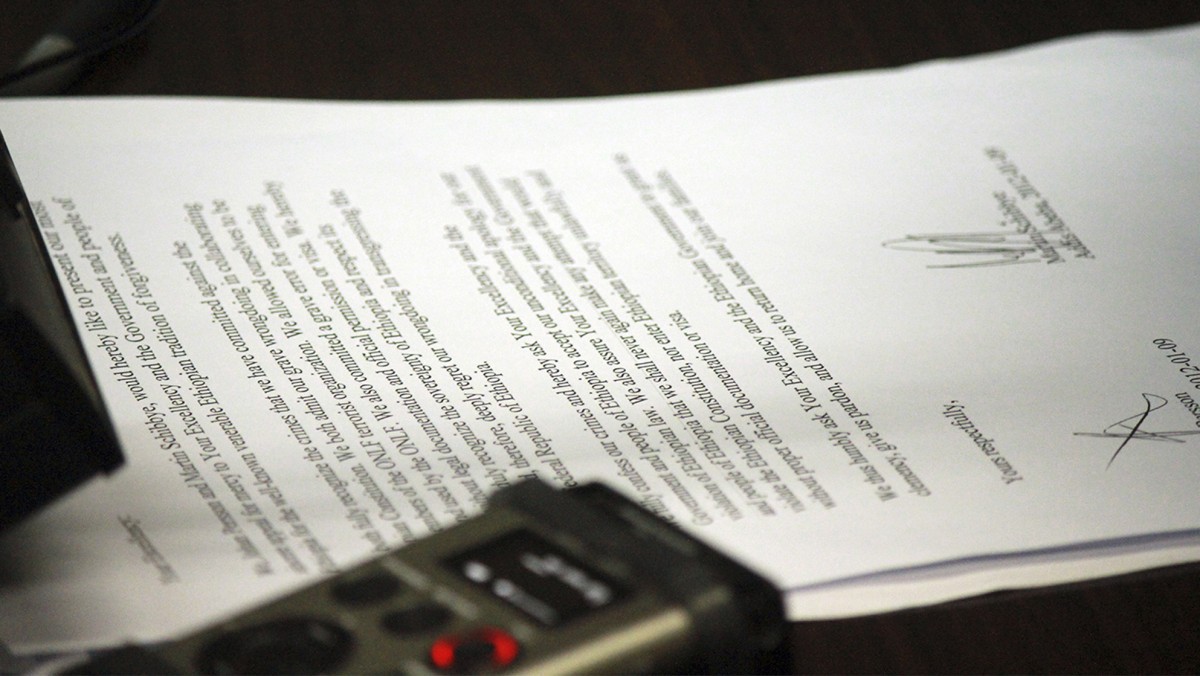
(NAMIBIA) MintPress — The Ethiopian government pardoned two Swedish journalists of terrorism convictions last week while dozens of journalists worldwide remain in jail on politicized terrorism-related charges, seen internationally as a clear attack on freedom of speech.
Reporter Martin Schibbye and photographer Johan Persson, who were convicted of “illegal entry into the country” and alleged “support for terrorism,” were released on the Ethiopian new year (Sept. 11) after spending 14 months in prison.
The two were accused of illegally entering the country’s oil-rich, Somali-speaking Ogaden region and supporting armed separatists there. Schibbye and Persson entered the area with the Ogaden National Liberation Front (ONLF) without documentation while on assignment for the Swedish news agency Kontinent.
“We should never forget that it is an international scandal that we were condemned to 11 years in jail for doing our job,” said Schibbye, who criticized Ethiopia’s anti-terrorism laws as an attack on freedom of speech.
Protecting journalists and bloggers, and freedom of speech
Since 2011, 11 independent journalists and bloggers have been convicted under sweeping anti-terrorism laws in Ethiopia. Six journalists remain in Ethiopian prisons; among them are Eritrean journalists Saleh Idris Gama and Tesfalidet Kidane Tesfazghi; award-winning columnist Reeyot Alemu; and award-winning blogger Eskinder Nega.
Eskinder Nega, a veteran, dissident blogger, has been jailed at least seven times over the past two decades. Eskinder faces a life sentence if convicted on terrorism charges for allegedly supporting the banned opposition party, Ginbot 7.
In Ethiopia, a person may be criminalized for reporting or publishing any information the government deems to be favorable to designated terrorist groups, including the ONLF and Ginbot 7.
Eskinder considers himself a prisoner of conscience and rejects accusations that he has conspired to overthrow the government through publishing “inciting” articles and interviews. Eskinder defended himself in front of a three-judge panel, saying, “I wrote about human rights and democracy and used my right to free expression to fulfil my duties as a concerned citizen.” Eskinder claims he has always insisted that political change must come from peaceful, democratic means and not through terroristic activities.
The Committee to Protect Journalists (CPJ) urges the Ethiopian government to release all journalists being charged with terrorism. “Martin Schibbye, Johan Persson and other journalists in Ethiopia have paid a heavy price for trying to uncover what the government is seeking to hide,” said CPJ East Africa Consultant Tom Rhodes. “As Ethiopia begins a new year today, we urge the country’s new leadership to truly begin afresh by releasing the six journalists still in prison.”
Are journalists propagating terrorism?
Ethiopia is a country whose relative stability has proven to be an important asset in U.S. counterterrorism in East Africa, but Ethiopian journalists have become too afraid of jail time to even cover the topic.
“The irony is, the government may pride itself on its efforts to fight terrorist groups, but we [reporters] will think twice before writing about it,” said a local journalist who requested anonymity in an interview with CPJ for fear of government retaliations.
“At this point, any Ethiopian opposition member living abroad is a terrorist, along with al-Qaida, and we sure as hell won’t interview them,” said another local reporter who also requested anonymity.
Terrorism allegations are seen as an attempt by the government to eliminate critical journalism. Terror charges create a climate of fear that intimidates and prevents the press from reporting on critical issues such as terrorism and democracy.
Journalists in Turkey share similar fears with reporters in Ethiopia; Turkish law forbids reporting or publishing information that may be interpreted as propagation of terrorist groups.
Just last week, trial began in Turkey for 44 journalists facing convictions on terror-related charges for associating with pro-Kurdish media, such as the news agency DIHA. Thirty-six of the accused journalists, who have been held in detention since last December, will remain in provisional detention for at least another two month while the trial stretches out.
In a live TV debate, Turkish Prime Minister Recep Tayyip Erdoğan expressed frustration with journalists for their role in publishing information about the Kurdistan Workers Party (PKK), an armed separatist group that is outlawed in the country.
“What are they [Turkish media] doing?” asked Erdoğan. “The most important target of terrorism is propaganda. [Terrorism] gets it done for free here. On whose side will the media be?”
In statements on Aug. 31, Erdoğan specifically ordered the media to stop reporting on fallen Turkish soldiers or other activities connected to the PKK. The prime minister stated that by reporting on fallen soldiers and kidnappings by the PKK, the media served as a propaganda platform for the PKK.
“They [the Turkish government] have turned journalists into criminals,” said Eren Keskin, co-chief editor of the pro-Kurdish daily Özgür Gündem. “Anything you write can be twisted into ‘making propaganda for a terrorist organization’ or insulting the military … or incitement to hatred,” she said.
Dozens of journalists, publishers, academics, activists and demonstrators have been prosecuted and imprisoned for alleged propaganda and other terror-related charges in Turkey.
Federal judge protects US journalists from similar terror charges
In June, a High Court in Burundi found reporter Hassan Ruvakuki and 13 other defendants guilty of “participating in terrorist attacks” under the country’s penal code. Ruvakuki, a reporter for a local radio station, was arrested because he recorded an audio statement from a former police officer claiming to be the leader of a new rebel group along Burundi’s border with Tanzania.
Watchdog organization Freedom House said in a statement, “A Burundi court’s decision to sentence a journalist to life in prison on terrorism charges for simply interviewing an alleged terrorist shows a flagrant disregard for press freedom and sets a dangerous precedent in a country already hostile toward the media.”
Fearing similar terror-related charges in the United States, journalists, scholars and political activists challenged the constitutionality of provisions in the National Defense Authorization Act (NDAA) that justified the indefinite detention of U.S. citizens suspected of “substantially supporting” a terrorist organization at home or abroad.
A New York federal judge ruled in favor of the plaintiffs last Wednesday, writing, “In short, the Court can find no authority in domestic law or the law of war, nor can the government point to any, to justify the concept of ‘support’ as a valid ground for detention.”
According to previous reports by MintPress, “If the NDAA were allowed to pass in its complete, unchallenged form, journalists could be detained indefinitely, without trial, for interviewing terrorists and individuals the U.S. government deems to be a threat to U.S. national security.”
Thanks to the federal court’s decision to uphold First and Fifth Amendment rights of U.S. citizens last week, journalists in the United States remain free for now of the overarching terror charges facing journalists in countries like Burundi and Ethiopia, who remain in prison for exercising their freedoms of speech. The Obama administration says it will take the case to the Supreme Court.


